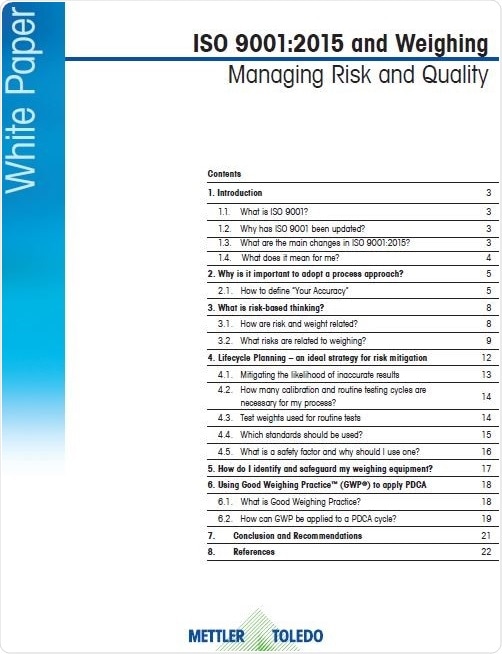Sep 20 2017
The ISO 9001 standard sets out the requirements for a quality management system (QMS), and aims to help businesses and organizations become more efficient and improve customer satisfaction. ISO 9001:2015 was released in 2015 and certified organizations have three years to adopt the changes into their own QMS, with a deadline of September 2018.

As described in this white paper, ISO 9001:2015 places greater emphasis on the process approach, with risk-based thinking becoming an important focus. Achieving continuous improvement is recommended by implementation of the Plan-Do-Check-Act (PDCA) cycle.
In relation to weighing and calibration, every organization is obliged to ensure that every balance or scale used in a weighing process is accurate enough to achieve the intended results. Weighing has a critical impact on product quality because quality is directly related to the accuracy of weighing results, and accuracy is determined through calibration.
To adopt the latest revisions to ISO 9001 for any processes which involve weighing, METTLER TOLEDO can support any organization to make a simple transition. Good Weighing Practice™, established in 2007 on many years of METTLER TOLEDO weighing expertise, is based on the risk-based thinking approach.
The elements required for each stage of the PDCA cycle are already defined and fully developed within the GWP® Recommendation and GWP Verification packages, making it easy to ensure that any weighing processes are ISO 9001 compliant.
This free white paper explains the ISO 9001:2015 changes and their implications for weighing processes. It explains what risk-based thinking involves and how to apply it to weighing processes, in order to establish optimum calibration and routine testing plans. It also describes Good Weighing Practice, which is a perfect fit for compliance with ISO 9001:2015, and offers the ideal way to apply a PDCA cycle for weighing processes.
Source: Mettler Toledo